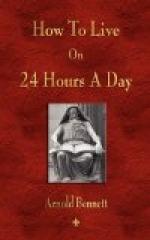You are “penned in town,” but you love excursions to the country and the observation of wild life—certainly a heart-enlarging diversion. Why don’t you walk out of your house door, in your slippers, to the nearest gas lamp of a night with a butterfly net, and observe the wild life of common and rare moths that is beating about it, and co-ordinate the knowledge thus obtained and build a superstructure on it, and at last get to know something about something?
You need not be devoted to the arts, not to literature, in order to live fully.
The whole field of daily habit and scene is waiting to satisfy that curiosity which means life, and the satisfaction of which means an understanding heart.
I promised to deal with your case, O man who hates art and literature, and I have dealt with it. I now come to the case of the person, happily very common, who does “like reading.”
XI
SERIOUS READING
Novels are excluded from “serious reading,” so that the man who, bent on self-improvement, has been deciding to devote ninety minutes three times a week to a complete study of the works of Charles Dickens will be well advised to alter his plans. The reason is not that novels are not serious—some of the great literature of the world is in the form of prose fiction—the reason is that bad novels ought not to be read, and that good novels never demand any appreciable mental application on the part of the reader. It is only the bad parts of Meredith’s novels that are difficult. A good novel rushes you forward like a skiff down a stream, and you arrive at the end, perhaps breathless, but unexhausted. The best novels involve the least strain. Now in the cultivation of the mind one of the most important factors is precisely the feeling of strain, of difficulty, of a task which one part of you is anxious to achieve and another part of you is anxious to shirk; and that feeling cannot be got in facing a novel. You do not set your teeth in order to read “Anna Karenina.” Therefore, though you should read novels, you should not read them in those ninety minutes.
Imaginative poetry produces a far greater mental strain than novels. It produces probably the severest strain of any form of literature. It is the highest form of literature. It yields the highest form of pleasure, and teaches the highest form of wisdom. In a word, there is nothing to compare with it. I say this with sad consciousness of the fact that the majority of people do not read poetry.
I am persuaded that many excellent persons, if they were confronted with the alternatives of reading “Paradise Lost” and going round Trafalgar Square at noonday on their knees in sack-cloth, would choose the ordeal of public ridicule. Still, I will never cease advising my friends and enemies to read poetry before anything.




